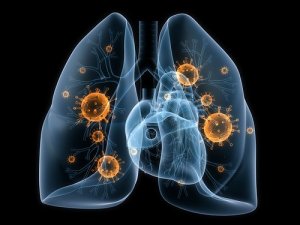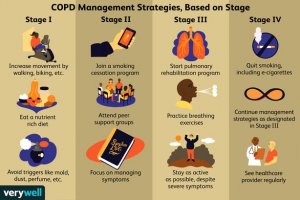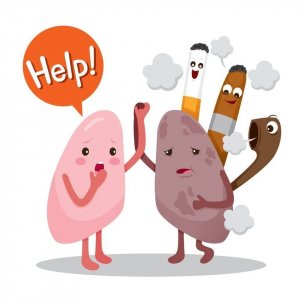What is COPD?
Chronic Obstructive Pulmonary Disease (COPD) is classified as a group of respiratory diseases, including emphysema and bronchitis, that cause a blockage of airflow to the lungs, making it difficult to breathe. Emphysema results in damage to the space between the lungs’ air sacs, And chronic bronchitis is due to irritation inflammation of the lining to the lungs. The main causes of COPD involve irritating the airway, with the number one as smoking cigarettes. Other causes include inhaling irritants over a long period of time, environmental allergies, chemical fumes, air pollution, etc., or having asthma.

By: John Voo
Signs & Symptoms
- Shortness of breath (with or without physical activity)
- frequent/excessive coughing
- increased mucus production
- Wheezing lung sounds
- a squeaking sound with regular breathing patterns
- Feeling tightness in your chest
Treatment/Management
Although there is no treatment for COPD and it cannot be cured, there are a variety of lifestyle changes that can ease the symptoms, decrease the number of exacerbations, improve physical activity tolerance, and to slow down the overall progression of this disease.

- Bronchodilators (inhalers) containing steroids can help to open up the airways and make breathing easier on the lungs
- Flu or pneumococcal vaccinations obtained early on can decrease the probability of developing COPD later in life
- Oxygen therapy may be necessary to keep body oxygen levels at an acceptable percentage
- Pulmonary rehab programs: disease management support groups, nutrition consults, physical exercise programs, psychological/mental health therapy
If you are worried about contracting COPD in the near future, or have experienced any of the early signs & symptoms from above, call your doctor and make an appointment. If you are experiencing any shortness of breath, or difficulty breathing at rest, call 911 and seek out emergency services. For more information, check out this resource from the CDC that gives you all basic information about the diagnosis of COPD, and everything you need to know about either preventing this disease, or managing its’ symptoms.
https://www.cdc.gov/copd/basics-about.html

References
Bollmeier, S. G., & Hartmann, A. P. (2020). Management of chronic obstructive pulmonary disease: A review focusing on exacerbations. American Journal of Health-System Pharmacy, 77(4), 259–268. https://doi.org/10.1093/ajhp/zxz306
Candela, M., Costorella, R., Stassaldi, A., Maestrini, V., & Curradi, G. (2019). Treatment of COPD: The Simplicity is a resolved complexity. Multidisciplinary Respiratory Medicine, 14(1). https://doi.org/10.1186/s40248-019-0181-8
Crisafulli, E., Barbeta, E., Ielpo, A., & Torres, A. (2018). Management of severe acute exacerbations of COPD: an updated narrative review. Multidisciplinary Respiratory Medicine, 13(1), 1-15.
Fazleen, A., & Wilkinson, T. (2020). Early COPD: Current evidence for diagnosis and management. Therapeutic Advances in Respiratory Disease, 14, 175346662094212.https://doi.org/10.1177/1753466620942128
What is COPD? (HealthSketch) – YouTube. (n.d.). Retrieved May 12, 2022, from https://www.youtube.com/watch?v=5fFNGH4U6mI

Hi!
I really enjoyed reading your blog. The videos are very informative and easy to understand. I liked how you incorporate bullet points to emphasize your information effectively. I never heard of oxygen therapy, so I am curious about how that works.